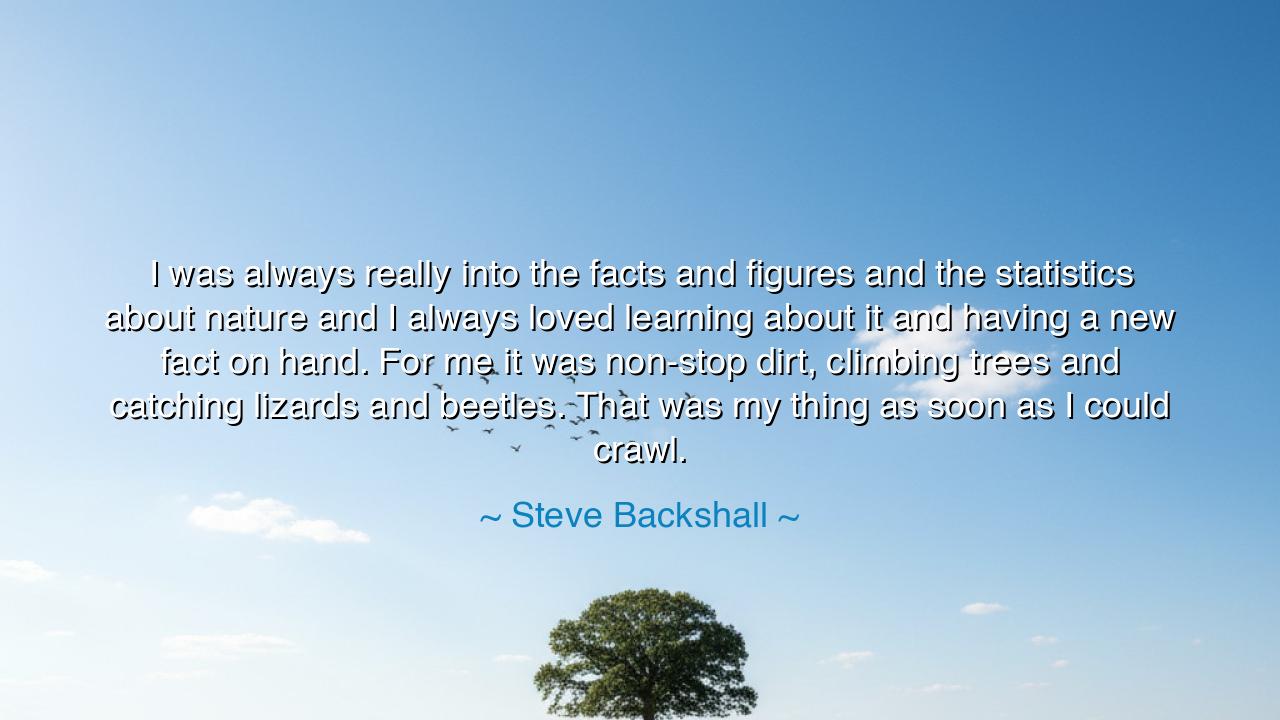
I was always really into the facts and figures and the statistics
I was always really into the facts and figures and the statistics about nature and I always loved learning about it and having a new fact on hand. For me it was non-stop dirt, climbing trees and catching lizards and beetles. That was my thing as soon as I could crawl.






In the councils of the elders it was said: the earth first teaches with touch, and only later with textbooks. Thus Steve Backshall’s remembrance—“really into the facts and figures and the statistics about nature… loved learning… non-stop dirt, climbing trees, and catching lizards and beetles”—is the confession of a child apprenticed to the living world. He speaks a double vow: to know with the mind by counting and naming, and to know with the body by scraping knees and muddying hands. The one without the other is pale; together they make a bright, durable curiosity that does not tire.
Mark the harmony he names. Facts, figures, and statistics are not cold stones but warm sparks when gathered from a field one has walked. A measured wing, a timed sprint of an ant over a leaf, the ratio of eggs in a nest—these numbers sing because they are married to the smell of leaf-mold and the sting of bramble. And the learning he loves is not a duty imposed from above; it is hunger—new data tucked like treasure into the pocket of memory, ready for the next campfire tale or quick rescue of a puzzled friend.
The ancients would call this the pedagogy of the elements. Dirt is the first chalkboard; it draws the map of tracks and roots. Climbing trees is geometry taught by bark and balance; one learns angles by reaching, levers by pulling, friction by gripping, and risk by listening to the wind in the crown. Lizards and beetles are tutors in patience and precision: the stillness before a swift hand, the gentle hold that does not harm, the quick sketch of what was seen before it flickers away. In such play, the child rehearses science without knowing its name.
A story from our lineage makes this plain. Young Charles Darwin walked the hedgerows of Shropshire with a beetle box and a burning itch for discovery. One day, holding two specimens, he spotted a third too rare to lose; lacking hands, he popped it into his mouth, only to be scalded by its chemical defense and lose all three. It is a comic parable, yet it bears a serious law: the road to understanding is paved with dirt, daring, and the occasional blunder. Darwin’s later facts and figures grew from those muddy miles; his arithmetic was fertilized by hedgerow awe.
Backshall’s words also guard against a common error: mistaking wildness for disorder and data for dryness. The boy who learns the Latin name of a beetle and the pH of the stream also learns reverence—because counting a thing without caring for it is empty, and caring without counting soon loses its way. The statistics of nature are a music of patterns: migrations like tides, populations rising and falling like breath. To memorize them without kneeling in the grass is to hum a tune without hearing the orchestra.
From this, take a clear lesson for the young and their guides: cultivate a two-handed knowledge. With one hand, gather facts—names, cycles, measurements—and write them faithfully. With the other, gather experience—mud, bark, sun, and the skitter of lizards under stone. Let the mind and the marrow study together, so that wisdom grows from the marriage of number and nerve. Then every statistic will have a face, every figure a field, and every lecture a memory of leaves.
Let counsel become practice. Keep a pocket notebook; tally birds at dawn, beetles at dusk, clouds by shape, and share one new fact at supper like grace. Build a small “museum” at home: acorn caps, shed skins, a feather found—each labeled, each story told. Climb with care: a tree you know in summer will speak a different lesson in winter; listen to both. Join a local bioblitz; lend your figures to a wider map. Above all, keep play at the center: kneel in the dirt, look under the next stone, and let the world teach you its quiet arithmetic. Do this, and you will carry Backshall’s spirit forward—a life in which learning never ends because wonder never does.






AAdministratorAdministrator
Welcome, honored guests. Please leave a comment, we will respond soon